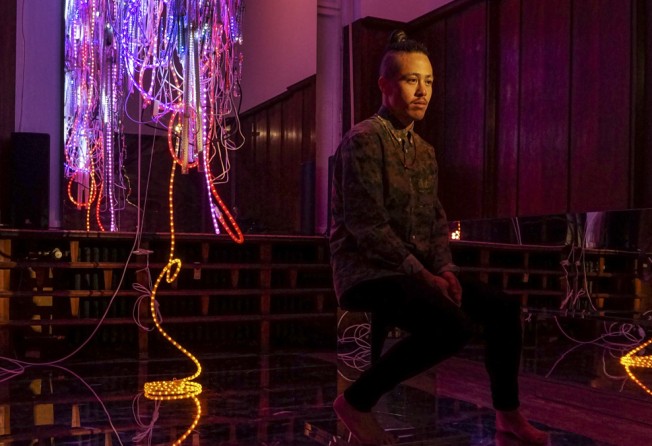Artist Wu Tsang gives LGBT community medium for communication

When Los Angeles-based artist Wu Tsang visited China for the first time in 2005, he was on a personal mission of discovery. He wanted to find his "ethnic roots" - Tsang's father was born in the southwestern city of Chongqing - and the artist had often dreamed of unearthing pieces of his past.
However, Tsang didn't find what he was looking for. "The trip was a very different experience from what I expected. It made me realise that the fantasy of finding a home or belonging somewhere was a fantasy, but I decided that fantasy was actually more interesting because it revealed unconscious truths," he says from Switzerland, where he was holding his first solo exhibition at the Migros Museum of Contemporary Art in Zurich.
What he did discover on that journey was the story of Qiu Jin, a Chinese revolutionary, feminist, writer and poet who was considered a national heroine. Born in 1875 and executed, aged 31, after a failed uprising against the Qing dynasty, Qiu Jin was also, according to Tsang, "rumoured to be a lesbian".
Now her story brings Tsang to Hong Kong for the first time, where the artist will work on a project about the poet during his residency programme at Spring Workshop in Aberdeen until the end of May. And it comes as no surprise that her story - a radical women's rights activist who defied tradition to become the leader of a revolutionary army - appeals to the artist. "I'm more interested in the queer lineages that we construct, rather than the idea of familial or 'authentic' ones."
It's Tsang's love for the fringe dweller, in particular those in the transgender community - Tsang self-identifies as transfeminine and "transguy" - that has seen his reputation as an artist grow while managing to successfully walk the fine line between art and activism. "I've always been involved with trans-activism, so of course I draw inspiration from those experiences, but I never have a political agenda. I believe art cannot give answers, it can only ask questions, so my work is successful if it provokes viewers to ask questions."
Born in 1982 in Massachusetts to a Swedish-American mother, Tsang studied art in Chicago, got a master's from UCLA in 2010 and, for the past 10 years, has called LA home. "I love LA - it's such an inspiring place for an artist to live and work. My work is very collaborative, and there's an amazing community of artists and musicians that I often work with in LA, and internationally."
LA's nightlife was the inspiration for one of Tsang's most recognised works - and his first feature: the 2012 documentary Wildness, an intimate portrait of the Silver Platter bar in LA where Tsang worked from 2008 to 2009 (he ran a weekly club night called Wildness). The bar is a popular hangout for the transgender Latino population and his weekly gigs were a hit with the LGBT community.
"The Silver Platter is a home space for a lot of people; people celebrate Christmas and Thanksgiving there," he says. "When Wildness started, it was a really different group of people but then the party became really cool, and there was some high-level press."
Keen to share stories from the club nights - about real people dealing with basic human problems of belonging and conflict - with a wider audience, Tsang opted for the medium of film despite not having any experience: "I didn't go to film school; I was not formally trained." Wildness premiered at MoMA's Documentary Fortnight in 2012, was shown at Hot Docs (Toronto) and won the grand jury prize for outstanding documentary at OUTFEST (Los Angeles). Its success added fuel to Tsang's film fire. His recent short, You're Dead to Me, premiered on US TV network PBS and last year won an Imagen Award, which recognise positive portrayals of Latinos in the entertainment industry - for best short. "My films are often a hybrid of documentary and fiction. I like to work with real life, real people, real situations - but filmmaking is … an act of creation, so there is always a level of artifice or illusion," he says.
"Wildness started out as a party and … evolved into a film because I felt an urgent need to tell a story, to translate my experiences to wider audiences, so the story could be shared. I like to work in film because it's an accessible medium; you can touch people's emotions, which can be a way of transforming their point of view."
With other video and performance art projects getting global exposure - his works have shown at London's Tate Modern, the Whitney Museum and the New Museum (New York), the Hammer Museum and MOCA (Los Angeles), and the Gwangju Biennale (South Korea) - the timing seems right for a project in Hong Kong. Tsang says he won't be following any well-trodden tourist path: he'll be forging his own path, one inhabited by the real people of Hong Kong. He's also excited about brushing up on his Cantonese.
"I've never been to Hong Kong and I'm excited because I want to practise Cantonese, my father's tongue. I hope to spend my free time exploring the city, but I intentionally have not made a to-do list because I want to be as open as possible to new experiences."